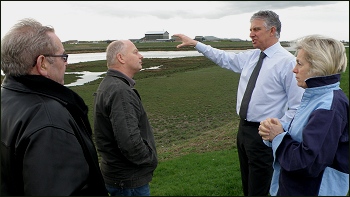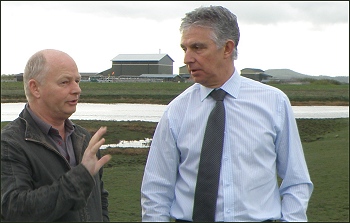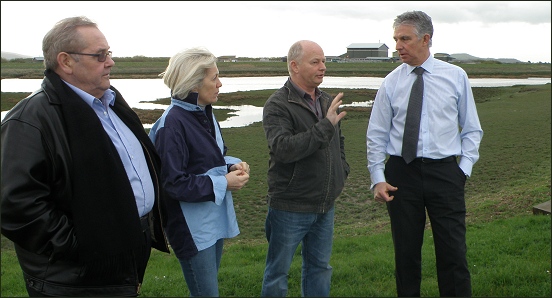Burnham-On-Sea’s MP has this week given her backing to villagers in Brean who have voiced their concerns at the £26million expansion of the nearby Lympsham sewage treatment centre.
Wessex Water is due to start construction of the new plant next week, leaving villagers and holidaymakers to suffer several months of noisy work over the summer months.
MP Tessa Munt this week met with Brean parish councillors Derek Petrie and Jon Harris and Wessex Water’s Project Manager Dave Jones at the site, pictured, where she heard concerns regarding the work to expand the centre.
She told Burnham-On-Sea.com: “There are widespread concerns over the noisy piling and excavation work which is being planned for a large part of the summer – such a crucial time for Brean’s tourist businesses – but Wessex Water has assured us that the impact will be kept to a minimum.”
“Some also feel that improved screening is needed to camouflage the centre from the village of Brean. On this, Wessex Water has agreed to consider painting its new concrete storm tanks in green and it will also plant some screening to shield holidaymakers from viewing the treatment works.”
 Parish councillor Jon Harris, from Warren Farm, told Burnham-On-Sea.com: “The noise and visual impact is a concern. Wessex Water has given us assurances that they will keep disruption to a minimum and reduce the visual impact, but there are no guarantees that people in the area will not be affected.”
Parish councillor Jon Harris, from Warren Farm, told Burnham-On-Sea.com: “The noise and visual impact is a concern. Wessex Water has given us assurances that they will keep disruption to a minimum and reduce the visual impact, but there are no guarantees that people in the area will not be affected.”
Wessex Water confirmed this week that piling work will begin on 3rd May and will not be completed until 15th July.
“We are aware that some people are concerned about the effect of construction work that will involve piling. We have carefully planned the work to avoid the Easter bank holiday, weekends and bank holidays, including that of the Royal wedding which may prove popular among tourists,” Wessex Water spokesman Ian Drury told Burnham-On-Sea.com.
He added that the piling work should be completed before the start of the main summer tourist season.
“Due to the Habitats Regulations, the piling work cannot be carried out over the winter months. We have therefore carefully timed the work to avoid popular dates for tourists visiting the area.”
“While we appreciate the concerns of local businesses, we have done everything possible to reduce impact on tourism while at the same time carry out statutory work to improve treatment processes at our site. In the long term the work will help to ensure tourists continue visiting the area as they will welcome the improvement to bathing water quality.”
 The firm added that the expansion of the treatment plant aims to improve bathing water quality in Weston to enable the resort to meet new EU bathing water standards.
The firm added that the expansion of the treatment plant aims to improve bathing water quality in Weston to enable the resort to meet new EU bathing water standards.
Currently, sewage is treated so it is clean enough to be returned to the sea safely and ensure Wessex Water meets mandatory bathing standards. However, under the revised Bathing Water Directive which comes into force in 2015, bathing waters at Weston Main beach and Uphill Slipway would currently be classified as ‘poor’ based on historic sampling results.
Wessex Water’s work at its Lympsham sewage plant involves increasing the secondary treatment and ultraviolet disinfection capacity which will improve the discharge quality from the sewage treatment works. Additionally, stormwater capacity will be increased to reduce the impact on rivers and sea during periods of intense rainfall.
Mr Drury also confirmed that with respect to the visual impact of the building, Wessex Water is in consultation with local representatives to consider painting new tanks so they will blend in with the local area.
“We are also discussing with local landowners the opportunity to provide natural tree screening to the works and are at the early stages of investigating with the Environment Agency as to whether we can raise the bund that surrounds the site to again screen the new works.”
Work on the scheme is due to get underway on Monday when machinery and material will be brought onsite. The work should be completed by the end of 2012.







